Archive
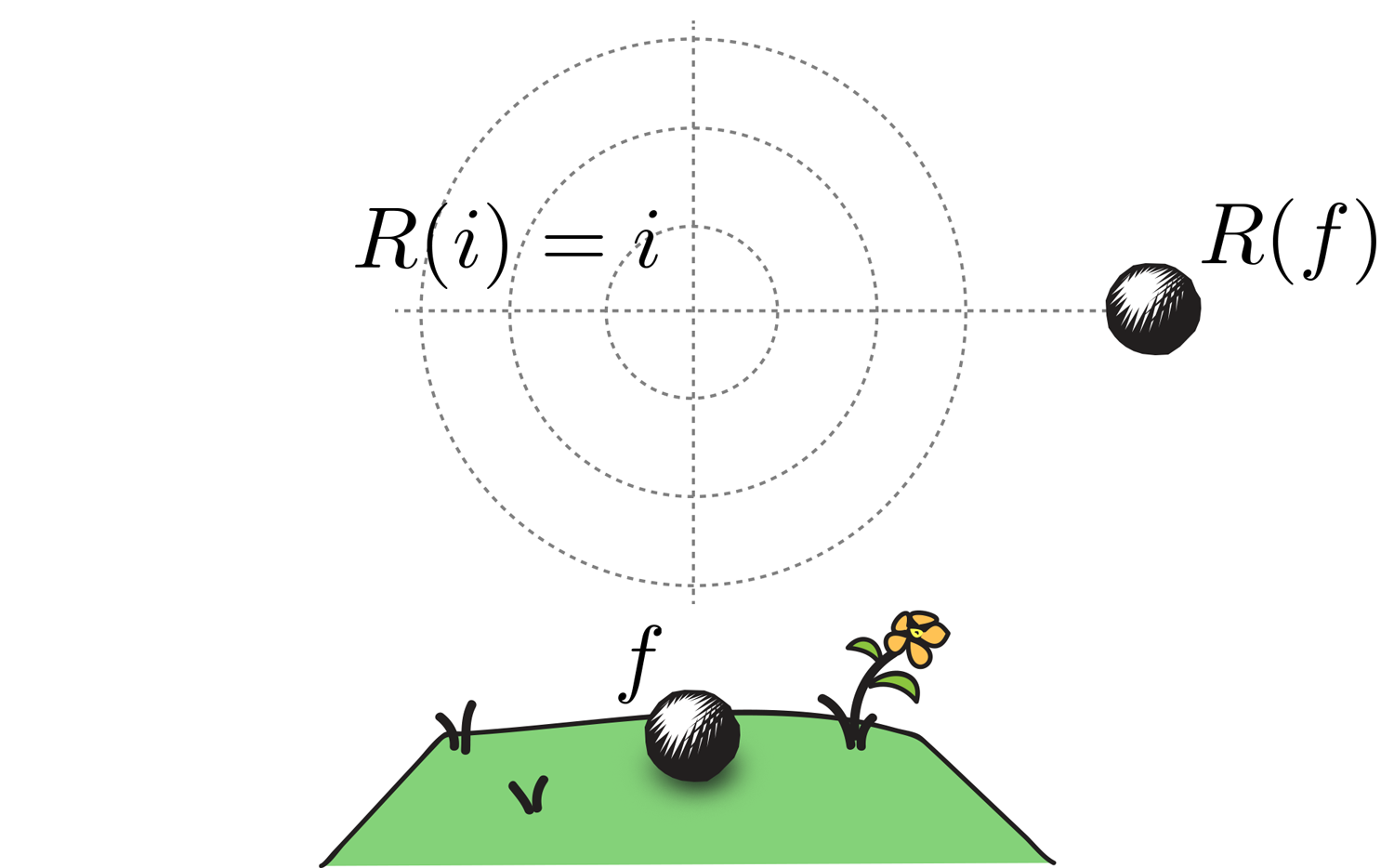
Curie’s Principle: Not a theorem, Not even for Ismael
Twenty years ago now, Jenann Ismael wrote a fascinating little article called “Curie’s Principle” (1997 Synthese), which discussed a symmetry principle due to Pierre Curie: “When certain effects show a…

The physics of the 2015 Supertide in Western Europe
The causes of tides The tides are caused by two things. The moon’s gravitational force pulling on the oceans. The sun’s gravitational force pulling on the oceans. An eclipse does not…
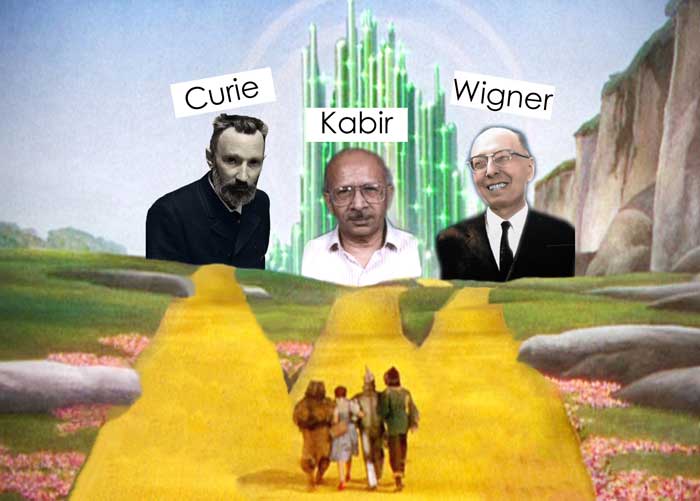
Three merry roads to T-violation
Last year I had a back-and-forth Abhay Ashtekar. It was during a lively conference organised by Emily Grosholz and hosted by the Center for Gravitaiton and the Cosmos where Ashtekar is director. Our discussion…
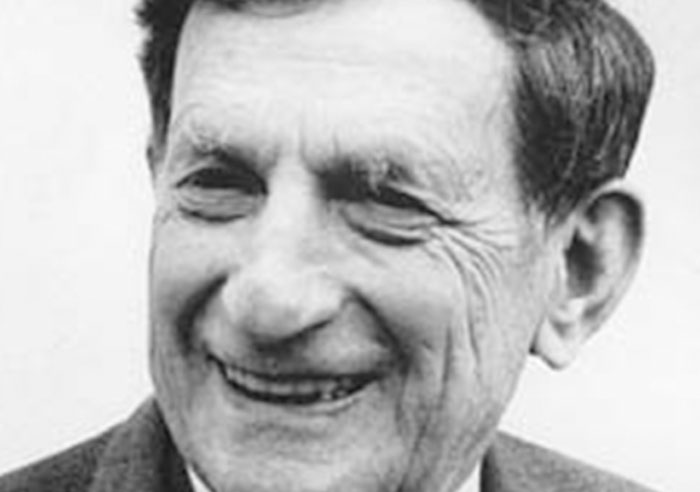
Bohmian Indeterminism
Bohmian mechanics is not just an “interpretation” of quantum mechanics. It is a radical revision. In this note, I’d like to point out one reason that it’s an implausible revision:…

Spatial translations in quantum mechanics
I remember that when I first learned the Canonical Commutation Relations in quantum mechanics, they seemed mysterious: I knew I was supposed to view this as a law…

Pauli’s Theorem is not a theorem (not as Pauli stated it)
There is a quirk in the literature on time-energy uncertainty. It might have started as a little sloppiness. But it has grown into an error that seems to have spread…
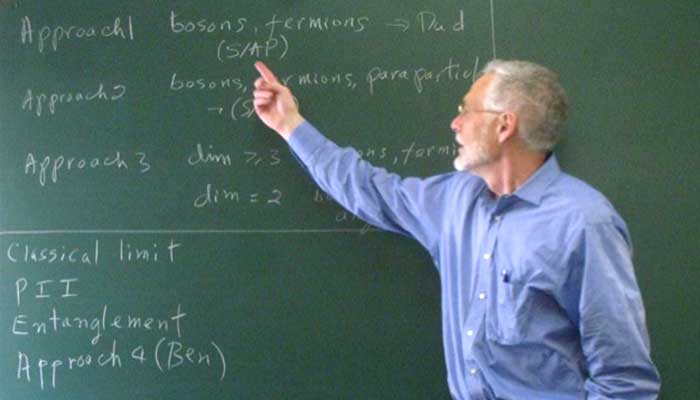
What is a superselection rule?
A superselection rule is a special limitation on what is observable in the quantum world. For example, we can never seem to observe interference from the relative phases between a…
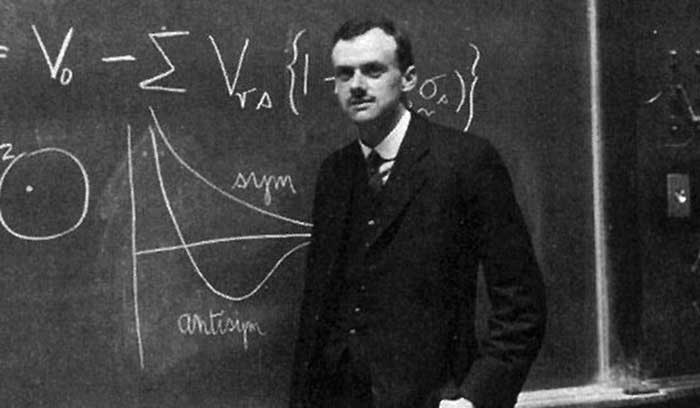
Philosophy and Physics in the Kadison-Singer Conjecture
A promising proof of the so-called Kadison-Singer conjecture was announced yesterday. Mathematicians are excited, because this conjecture is equivalent to a remarkable number of open problems in other fields. And…

Writing a book on time reversal
So, I’m writing a book on the foundations of time reversal. I’ve decided to bring back the Soul Physics blog to talk about the book as it’s being written, and…

Beyond the CPT theorem
Virtually all known laws of physics are invariant under the CPT transformation — that is, the combined operations of Charge conjugation (C), Parity or “mirror flipping” (P), and Time reversal…
Four 1975 Lectures by Paul Dirac
Slobodan Perovic (via Chris Joas) pointed this gem out to me. Four wonderful lectures given by Paul Dirac in 1975, on various topics in the foundations of quantum theory and…
Stop commercializing academic publishing
Dear academic publishers: your business model runs completely counter to the aims of the academic community, for this reason: academic publishing is not like commercial publishing. Stop conflating the two.…
Philosophy of Science Journals and Elsevier
Not Elsevier Elsevier Journal Publisher American Philosophical Quarterly University of Illinois Press Analysis Oxford University Press Australasian Journal of Philosophy Taylor & Francis (Routledge) Biology and Philosophy Springer Verlag British…
Sellars and the Philosophy of Physics
In a letter to Chisholm, Wilfred Sellars wrote: Thus, while I agree with you that‘. . .’ means – – – is not constructable in Rylean terms (‘Behaviorese,’ I have…
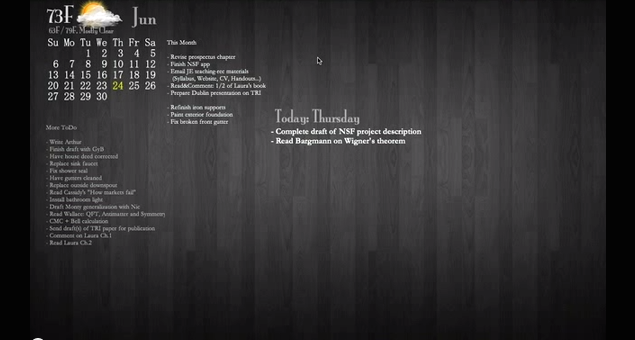
Elegant Desktop ToDo List
People often ask about the Desktop ToDo list that appears in my academic citation tutorial. So, here’s the scoop on this simple and elegant ToDo list system, which can be…
The three-way duel
The late great Martin Gardner once posed this puzzle. Suppose you’re involved in a duel with two other people. You (Person A) shoot first, followed Person B, followed by Person…
CPT: The ‘Intuitive’ Approach
Khriplovich and Lamoreaux (1997, §2) suggest a very interesting argument that CPT provides the correct notion of “complete reversal” in physics. The background assumption is that “complete reversal” should have…
Even more philosophy of physics conferences, Summer 2010
If you know about the usual summer conferences and are still looking for more: Hannover: Philosophy of Physics in Germany – Current State and Perspectives (11-12 Jun 2010). If you…
Overheard at New Directions in Foundations of Physics ’10
If you missed New Directions in Foundations of Physics conference earlier this month, here are a few memorable one-liners. You’ll notice that many are from Bill Unruh, who seemed to…
An argument for hidden variables
Detlef Dürr, Shelly Goldstein, and Nino Zanchí once gave a very interesting argument for hidden variables. I’ll give their argument a careful reconstruction. But first, here’s what they say. According…
Accuracy, Applicability, and Tarskian Semantics
by Erik Curiel (Guest Post) First is a concise statement of my problem with contemporary accounts of those semantics, as based on the idea of truth as, in some sense,…
In Memory of Bacon
Not the fatty breakfast-food, although you may remember that if you like. The great Sir Francis Bacon died 384 years ago today. And in memory of Bacon, here is your…
Improving the Peer Review Process
Peer-reviewed journals have the great potential to improve the quality of published papers. Most scholars value them for this reason. But how can we make the process better? Bee has…
Watch the LHC status updates live
The Large Hadron Collider has finally begun collecting data for 7 TeV collisions. They’ve set up an interesting live feed, in which you can keep an eye on the collision…
Constructing the Ultimate Machine
The mathematician and engineer Claude Shannon kept a machine on his desk, which he called “The Ultimate Machine.” As it turns out, there are a number of clever instantiations of…
Wigner’s elegant characterization of time reversal
There’s a nice post at The Eternal Universe illustrating discrete symmetries like time reversal. The father of this idea, Eugene Wigner, actually gave a very elegant characterization in his 1931…
Conferences for Philosophers of Physics, Summer 2010
April 30 – May 2. Washington, D.C. New Directions in Foundations of Physics. Speakers: Michel Janssen, Tony Duncan, Elise Crull, Fernando Brandao, Bill Unruh, Dan Browne, Scott Aaronson, Valerio Scarani,…
David Albert on symmetries of motion in quantum mechanics
In Time and Chance, David Albert writes that since the Schrödinger equation involves a first (instead of a second) derivative, “the dynamical laws that govern the evolutions of quantum states in…
Bob Batterman moves to University of Pittsburgh
Bob Batterman, currently at the University of Western Ontario, has been hired by the University of Pittsburgh’s Department of Philosophy. One more reason to love history and philosophy of science at the…
Two Pictures of Laws and Initial Conditions
Chris Wüthrich over at Taking Up Spacetime has an interesting post about laws and initial conditions, and an old objection by Sklar (1984). The post started me thinking about an…
Reasons to love the "Dark Energy Task Force"
It’s official: the words ‘dark,’ ‘energy,’ ‘task,’ and ‘force’ have all been used in the title of a single scientific paper. The “Report of the Dark Energy Task Force” is…
1907 Crisis in Mathematical Physics According to Poincaré
With 20-20 hindsight, we all agree that Einstein’s discoveries of 1905 revolutionized nearly every area of fundamental physics. But what did scientists think at the time? One telling source is Poincaré’s 1907 account of…
Keep your caffeine tank at its optimum level
Keeping your caffeine tank full is an essential part of history, philosophy and physics. Follow this easy chart to keep your caffeine intake at its optimum level. (Data from Wisebread.com.) Related…
Translation of the long-lost Descartes letter
Amazingly, a long-lost letter by Descartes was recently recovered from the Haverford College outside Philadelphia. The letter’s discoverer, historian Erik-Jan Bos at the University of Utrecht, has now produced an English…
Is philosophy fracturing, and what should we do about it?
I was once a teaching assistant for John Earman’s “Introduction to Philosophy of Science” undergraduate course. On the very first day of class, John put this image on the overhead…
Rescher Prize for Contributions to Systematic Philosophy
Photo Credit: John D. Norton The University of Pittsburgh has announced the establishment of the Nicholas Rescher Prize for Contributions to Systematic Philosophy. The details: Rescher Prize gold medal for…
A peek inside the mind of a mathematician
This is not new, but it’s one of the very best math videos on the inter-tubes. It’s designed by Bill Thurston, who’s known not only for his mathematical talent (winning him…
More Philosophy of Physics in the Blogosphere
Readers of this blog may be interested in Chris Wüthrich’s new blog on the philosophy of physics, Taking up Spacetime. Chris is a philosopher of physics at UCSD, and fellow…
"An elementary particle ‘is’ an irreducible representation"
A well-known particle physicist’s adage: Ever since the fundamental paper of Wigner on the irreducible representations of the Poincaré group, it has been a (perhaps implicit) definition in physics that an elementary particle…
Unitary operators and spacetime symmetries
In quantum mechanics, certain unitary operators have been understood since the time of Wigner in terms of spacetime symmetries. Why? The foundation for this kind of thinking has an interpretive and…
Get Started Reading Recent Classics on the Philosophy of Physics
Which philosophy of physics books are relatively recent (say, post-1980), but still clear classics that every graduate student in the field should at least paw through? Here’s a preliminary list,…
Galilean Freefall Confirmed
It wasn’t centuries of successful theories of mechanics, planetary dynamics, and interplanetary travel that confirmed Galilean freefall. Oh no. It was this. Soul Physics is authored by Bryan W. Roberts.…
Special Relativity and the Bell Theorems
The Bell Theorems, together with a collection of experimental results (such as those of Aspect et al.), provide good statistical evidence that quantum theory is “non-local.” Roughly, this means that…
PSA Submissions Are a Go
The Philosophy of Science Association is holding its biennial conference in November, in Montréal, QC. Many of you were frantically preparing your manuscript for submission before midnight last night. Phew!…
Announcement: Meet Me in North Carolina
*Beeeeeeeeep* (Is this thing on?) Ahem. Are there any philosophers of science out there who, on the weekend of February 27th, will be either (a) attending the NCPS/SCSP annual meeting,…
How would negative mass behave in a gravitational field?
Answer: exactly the same way positive mass would. That’s unusual, because if you try to push a negative mass, it behaves in surprising ways. While a positive mass will accelerate…
Soul Physics: Best of 2009
If you’re new to Soul Physics, try some of our classic posts! The following posts received either a lot of traffic or a lot of comments (or both) in 2009.…
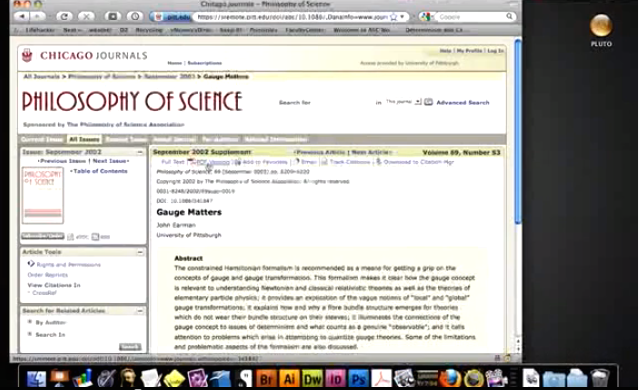
Get Started Handling Academic Citations Like a Pro
Using a Mac to do your academic work? Here’s a brief tutorial on how to optimize your day-to-day dealings with academic citations, by integrating Bibdesk, Textmate, Quicksilver and Scholar. Below,…
Ice water on closed timelike curves
Today, let’s kick off our shoes and relax our standards for what counts as a reasonable spacetime. Let’s talk about spacetimes allowing for a certain kind of time travel, called…
Where the material conditional gets its truth conditions
Oh, the material conditional. Some love it, some hate it. But can we all agree that explaining it to the uninitiated is a perennial headache? If you’ve taught baby-logic, you…
How to time-reverse a quantum system
Time-reversing a classical Newtonian trajectory is simple. If q(t) and p(t) are the positions and momenta of a particle on the trajectory, then time reversal flips that trajectory as follows:…
2009 Nobel Laureates in Physics
The 2009 Nobel Laureates in Physics have been announced! This year the award honors pioneers in information technology. Half the prize is going to Charles Kao (Standard Tel Labs), and…
Visualize a Wave Function
Can you visualize a normalized wave function on spacetime? Let’s try with a simple example. The role of a wave function is to assign a complex number to each point…
Galileo and the Physics of Skydiving
During a visit to Skydive, PA yesterday, I noticed jumpmaster Jim tightening a corset-like weight belt onto his abs. “Jim, your figure looks so refined,” I commented. Jim sneered. “I’ve…
Galileo’s Manuscripts: Still Learning the Lesson
When I studied history of science, my teachers — especially Ken Manders and Paolo Palmieri — hammered two principles like drill sergeants: Always read the original manuscripts; Always pay attention…
Hyper-intelligent fish and black hole thermodynamics
Bill Unruh’s recent collection on black hole analogues begins, Deep beneath the great encircling seas of the Discworld lived a species of hyper-intelligent fish. (Unruh 2007, p.1) Unusual, but inspiring:…
Springer Publishes Crank ‘Proofs’
crank, n. A pejorative term for a person who holds a belief that a vast majority of their contemporaries consider false. A “cranky” belief is so wildly at variance with…
Get Started Teaching Philosophy
Ok, you’re teaching philosophy. You know what you want to teach. But how do you achieve your goals? The simple answer, I think, is through strategy. Practically, teaching philosophy is…
Saving Mathematics
The despicable state of K-12 mathematics in the US has been summarized in one charming, witty, furious article by Paul Lockhart. That’s Lockhart the mathematician-turned-gradeschool-teacher, not Lockhart the astronaut. He…
Penrose in Pittsburgh
Roger Penrose came to Pittsburgh on Friday, presenting his new picture of cosmology. It was my first time seeing a Penrose presentation, and I was delighted to find it filled…
Can Time Unfold in the Wrong Direction?
The unfolding of time is typically described as a sequence of spatial regions: one region of space gets realized, and then another, and then another. For example: consider a region…
How to Create a Closed Timelike Curve
Time along the vertical axis; space along the horizontal…. Voila! And now, how to travel to the past…. Soul Physics is authored by Bryan W. Roberts. Thanks for subscribing. Want…
Did All Calorists Believe in Caloric?
There is a lot of literature about how it is that important successes in science apparently stemmed from false belief. Belief in the existence of caloric is a common example:…
Soul Physics Meets Cosmic Variance
Sean Carroll of Cosmic Variance made his way to Pittsburgh on Friday. Sean and I managed to solve the problems of the Universe over lunch (more or less), before his…
How Time Really Passes
We all experience the passage of time. This is not an illusion. We agree on the serial delivery of moments, and it is very hard to dislocate us from this…
Get Started Playing Ehrenfeucht-Fraisse Games
Ehrenfeucht-Fraisse games are a very useful method in logic, when you’re trying to figure out if two models are elementarily (logically) equivalent or not. This may be of special interest…
Another Unexpectedly Simple Failure of Determinism
Here’s a simple Newtonian system that fails to determine a unique Cauchy evolution, in the spirit of Norton’s dome. In the system I will describe, one begins with a mass…
Why does matter follow geodesics?
In the very first lessons on General Relativity, we learn that free particles follow geodesics — the equivalent of straight lines in curved spacetimes. Why? Well, it’s easy to show…
Possible Positions on the Passage of Time
Presentism The present exists; the past and the future do not. Block The past, present and future all exist. Growing Block The past and present exist; the future is coming…
Get Started Reading Blogs on the Philosophy of Science
Want to read some nice raw philosophy of science? Here are twelve options that I highly recommend. It’s Only a Theory is a new blog on the philosophy of science,…
Two Tough Cases of Underdetermination
John Earman once pointed out two tough cases of underdetermination, neither of which arises in a silly algorithmic way. Today, I’d like to argue for an important difference between these…
No, there are STILL no deadly mini-black holes!
Kentucky, who runs a fantastic blog over at arxivblog.org, has pointed out a new calculation about black hole creation here on earth. The paper (arxiv) suggests that mini-black holes might…
Group Structural Realism (Part 4)
Part 1 | Part 2 | Part 3 | Part 4The Higher Structures Problem. My worry about structural realism starts with the observation that a relation is a very general…
Visualize the Eversion of a Sphere
It is famously possible to continuously deform a sphere until it’s inside out. You have to imagine the sphere is something like a bubble, which can ‘pass through’ itself. This…
Group Structural Realism (Part 3)
Part 1 | Part 2 | Part 3 | Part 4Group Structure and Theory Change. Can groups do a better job at surviving theory change than individual objects? Here’s one…
Group Structural Realism (Part 2)
Part 1 | Part 2 | Part 3 | Part 4Wigner’s Legacy. Yuval Ne’eman and Shlomo Sternberg have recorded an old particle physicist’s adage: Ever since the fundamental paper of…
Group Structural Realism (Part 1)
Note: This post later turned into a paper, which turned into a forthcoming article in BJPS. You can read the full preprint here: PhilSci Archive.Part 1 | Part 2 |…
Happy 2009! Five Tutorials for Philosophers of Physics
We need more free resources and more helpful tips in the philosophy of physics. There are certainly some out there, but it would be great if they were easier to…
Quantum of Solace
What does quantum mean? With a new Hollywood blockbuster just out, and containing the word “quantum” in the title, it seems we’d better get to the bottom of this. The…
Philosophy of Physics Webcam-Debates
Sean Carroll and David Albert have had a couple of really interesting recent video-debates on BloggingHeads. If you haven’t checked this phenomenon out already, I highly recommend the following: Sean…
Map of the Cosmic Acceleration Literature
Ten years ago, the physics community came to agree that the expansion of the Universe is experiencing a positive acceleration. The experts still disagree on why. Everything but the kitchen…
Special: What’s With the Economy.
I’m a philosopher of science, not an economist. So I decided to write a story that explains what’s with the economy, using small words and Disney characters. The first 5…
Geneva Summer School in Philosophy of Physics
Read About It Here. The Geneva Summer School in Philosophy of Physics, 2008 was a 1-week intensive summer school in the middle of the Swiss alps. This year, scholars and…
What is Interesting in the Philosophy of Physics?
Philosophers of physics may have experienced this problem. You know you’re interested in a particular question about physics. You come face to face with the mountain of literature on the…
Rotating Discs in GR: Part I
Introduction. Craig Callender (2001) and Jeremy Butterfield (2004) have recently suggested that the Rotating Disc Argument (RDA) fails in General Relativity. I argue that this conclusion is wrong: two recharged…
Get Started Improving Your Philosophical Apparel
It’s easy enough to find science t-shirts and apparel out there. But how are you going to improve you philosophical style? Today, I’ll suggest a few places where you can…
How Special Relativity Thwarts Eternalism (And More)
Image Credit: John D. Norton INTRODUCTION. The image above illustrates a well-known argument due to Rietdijk and Putnam, which says that Special Relativity implies Eternalism (also called the “Block Universe”…
Riemann Hypothesis Gets Proved Again
Yet another proof of the Riemann Hypothesis (RH) has been proposed by BYU mathematician Xian-Jin Li. Dr. Li posted his proof on the arXiv a few days ago. (Update, 11:05am.)…
Group Theory Of Your Spine
In more examples of the unreasonable effectiveness of mathematics, there now exists a robust application of group theory to the human spinal cord. Modeling the Human Spine. A few years…
Famous Dead Philosophers Speak Again!
Inspired by Shawn’s post at Words and Other Things, I compiled a short list of video/audio lectures by famous dead philosophers. If you know of any famous dead philosophers that…
Update on the LHC: Still No Mini-Black Holes
The new CERN press release has finally come out, with the latest report on the (nearly-go-for-launch) Large Hadron Collider. No surprises, of course. The major new result is strong evidence…
Call for Suggestions: Greatest Physics Books of the Last 25 Years
As Sean Carroll at Cosmic Variance has pointed out, Entertainment Weekly is weighing in on the Greatest Books of the Last 25 Years. Like Sean, I am a bit disappointed…
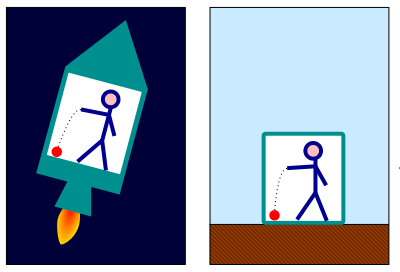
Get Started Learning General Relativity Online
General Relativity is the theory of gravitation introduced by Einstein in 1915, and developed throughout the 20th century. And you’ve decided you want to learn it. But why spend hundreds…
Could You Have Defended Galileo?
The Problem. When Galileo died in 1642, there were still two competing schools of free fall. The Galilean School upheld Galileo’s law of free fall, which may be posed either…
An Enormous Test of Bell’s Inequalities
Nicolas Gisin (and colleagues) have executed an enormous test of the Bell-inequalities! Their experiment will span laboratories in the cities of Geneva, Satigny, and Jussy. I believe that makes it…
Visualize a Black Hole at the Event Horizon
This cute little animation shows the causal structure around a classical black hole in an interesting way. The perspective is that of a body orbiting just outside the event horizon:…
How Far Out Is Quantum Theory Really?
The quantum world is commonly conceived of as (i) wildly strange, and (ii) far removed from everyday experience. But (i) certainly need not be true: many find quantum theory quite…
PHIL-∞: An Infinite Seminar?
Can every philosophy seminar be correctly completed in either finite time or infinite time? Here’s a (gödelesque) answer in the negative, in the form of a philosophy seminar I’m calling…
Pittsburgh HPS Proves That P
Who knows where these came from, but I’m sure that they are not endorsed by the parties mentioned. Earman. Start with plain vanilla Minkowski spacetime (in which obviously not p),…
When is the Prime Age of Discovery in Physics?
Remember that old adage about young scientists? It goes something like this: most scientists do there best work before they’re 25. I don’t know where this folk truism comes from,…
n-Player Chess
Have you ever wanted to play a single chess game with two other people? What about with three or four other people? Is it possible to design a chess game…
Get Started Reading Books and Articles on the Cheap
Tired of paying too much for textbooks, books, and articles? Tired of paying anything at all? With a little bit of effort, you can reduce the price of an otherwise…
Fundamental Rubik’s Cube Problem Is Nearly Solved
Question: What is the maximum number of moves required to solve a Rubik’s cube? Nobody knows the answer yet. But it’s either 21, 22, or 23 moves, and we’re about…
Strange Fermilab Code Nearly Cracked
The Fermi National Accelerator Laboratory, or Fermilab, hosts the second largest particle accelerator in the world (next to the LHC), and employs hundreds of physicists from around the world. Hundreds…
Solving the Black Hole Information "Paradox"
In January, Abhay Ashtekar posted a short preprint in which he (along with two collaborators) proposed a new solution to the so-called black hole information paradox in 1+1 dimensions. Their…
Get Started Improving Your Philsci Archive Experience
You may already know that Philsci Archive is the way to stay updated on new developments in the Philosophy of Science. Here are three easy tricks to make your experience…
A 4-Line Proof of the Isoperimetric Theorem in 3D
Here’s an example of what might be called “biological proof” of a mathematical claim. Proposition (The Isoperimetric Inequality). The solid that minimizes the ratio of surface area to volume (SA/V)…
When Philosophers of Science Go Practical
Here’s a feature of philosophy of science that may have captivated many of us: the freedom to be shamelessly, wildly creative about science. Philosophers of science love to think hard…
Get Started Using Automatic Symbol Insertion in MS Word
So you write with mathematical symbols. You’re not interested in learning LaTeX. But you’re fed up with going to Insert > Symbol every three seconds in Microsoft Word. Here is…
Observationally Indistinguishable Dark-Energy Theories
Fundamentally different theories of dark energy may be underdetermined by observation, according to a recent preprint by Sanil Unnikrishnan. Background. Dark energy was first proposed as a solution to the…
Is the cosmological metric about to flip Euclidean?
The ‘wildest excuse for cosmic acceleration’ prize so far should go, in my view, to these guys. They argue that the metric form of spacetime is about to flip from…
Does Google’s Logo-Artist Like His Father Better Than His Mother?
Too impatient to wait until Sunday, my wife decided to investigate what the Google Logo might be this Mother’s Day, on the basis of previous years. She was upset to…
Michelson-Morley meets Quantum Mechanics
The Michelson-Morley experiment (read the original paper here) is one of the first textbook experiments that you learn about in support of the light postulate. From this postulate, together with…
New Directions in Foundations of Physics 2008
On Friday afternoon, John Norton and I packed our bags and headed East to Washington, D.C., for the annual New Directions in Foundations of Physics conference. Here’s a little taste…
Relativistic Rolling Ball
I’ve been thinking about this problem all morning. Imagine a homogeneous spherical mass that rolls along a flat plane without slipping, with uniform velocity v in the lab frame. Consider…
Stringtime in Pittsburgh
Yes, last weekend it was Stringtime here in Pittsburgh! (No, we don’t have the good taste to resist that pun.) Here’s the Part I of my report. First, the background:…
Astrophysics with Ice Cube
The article is available here. That’s right. If you thought that identifying galactic cosmic rays was funky, try doing it with IceCube. Wes sai! Apparently, IceCube has recently been involved…
LHC Black Holes: Why I’m Not Holding My Breath
The attention that these two nut-jobs are receiving is a bit discouraging. Some people do hope to see mini-black-holes at CERN, it’s true. Some calculate that we will see thousands.…